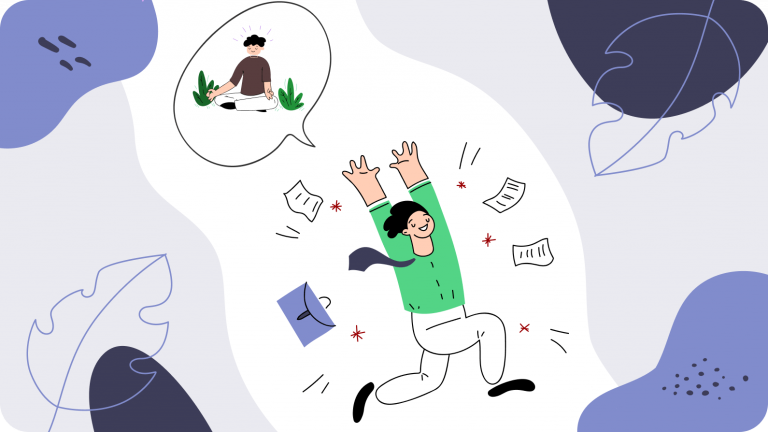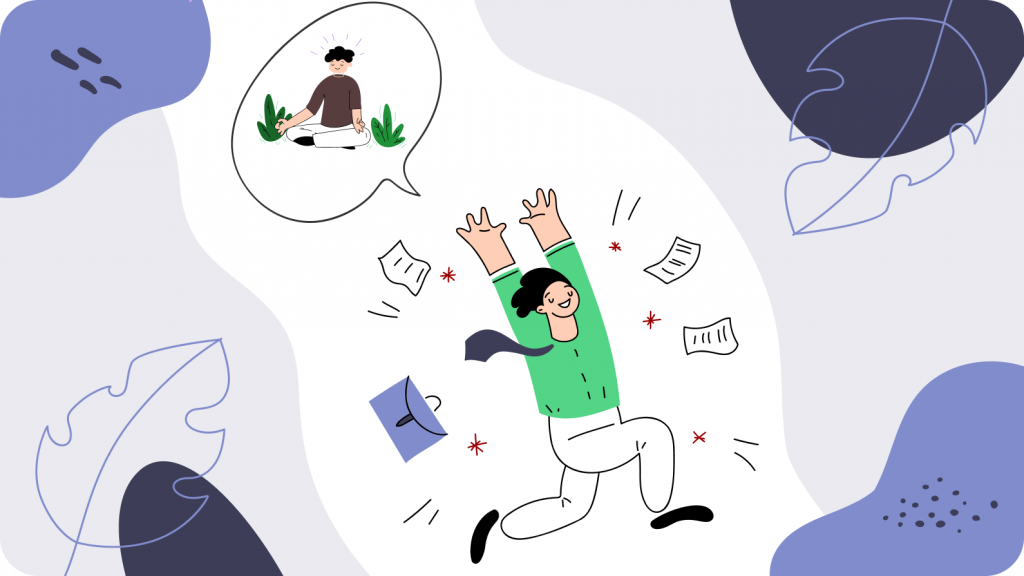Does Meditation Stress You Out? Here’s What I Do Instead!
My first blog was about a Buddhist! It all began on a sun-drenched beach in Dubai, where I stumbled upon a perplexed Buddhist monk trying to snap a selfie with the ocean. So I offered to help, and that small act of kindness spiralled into a whirlwind of unexpected experiences. Before I knew it, I attended meditation retreats and gave corporate presentations alongside my newfound monk friend. A few years on, and here I am, still trying—and mostly failing—to meditate.
Neuroscience has a wealth of research backing up meditation (thanks, Schlechta Portella et al., 2021!). With countless fMRI studies and meta-analyses (shout out to Fox et al., 2016) singing the praises of mindfulness, it’s hard not to feel a little left out when I don’t experience the same magical transformation. Instead, I’m left feeling guilty for not “getting it.” So, after countless attempts, I’ve decided to ditch the pressure and find ways to unwind, relieve stress, and—most importantly—ditch the guilt.
Why It Isn’t for Me!
Meditation is ubiquitous, particularly mindfulness meditation, which has become the trendiest practice since bell bottoms! It promises numerous benefits: personal transformation, improved mental health, enhanced focus, reduced stress, and entrepreneurial success. I admit I was drawn into the hype—attending mindfulness workshops, downloading all the apps (Headspace, anyone?), and chatting with meditation experts like my monk friend. But guess what? I never found it enjoyable or helpful. Seated meditation often stresses me out (I have a bad knee and cannot cross my legs).
Feeling guilty, I decided to open up about my meditation struggles and discovered I wasn’t alone. Many friends admitted they found meditation underwhelming or even irritating. Not everyone can find their zen in sitting still and watching their breath. Yet, the prevailing narrative—especially in the West—often makes those who don’t enjoy meditation feel as though they are missing out on a crucial life skill.
The Dark Side of Meditation
These conversations have revealed that meditation isn’t always the peaceful, calming practice it’s touted to be. Emerging evidence suggests it can sometimes have negative effects. Meditation doesn’t automatically improve everything; it simply brings awareness to what’s already lurking beneath the surface. And for some, that awareness can be a bit unsettling.
Why Meditation Stresses Me Out
Let’s be real: meditation is hard work! It’s supposed to be relaxing, but, it feels like a chore. I know it’s not meant to be a quick fix, but as someone who thrives on challenges, I secretly hoped for at least a few small wins. After years of trying to be mindful—through guided meditations and mindfulness-based stress reduction (MBSR) courses—I’ve found it nearly impossible to sit still and “just be” for thirty seconds or more. Instead of feeling peaceful, I usually end up emotionally drained and frustrated.
So, I’ve waved goodbye to meditation. I’ve stopped forcing myself to sit quietly and follow my breath because it stresses me out. Instead, I’m on a journey of exploration and self-discovery to find other ways to find calm that feel far more natural and enjoyable.
What I Do Instead
Rather than meditation, I’ve explored a variety of practices that help me manage stress and cultivate self-awareness. These various techniques seem to work for me:
- Exercise
Every day (weather permitting), I hit the woods! If I am near the ocean, I swim! Exercise doesn’t require the mental gymnastics that meditation does. There’s no pressure to do it “right.” I simply soak in my surroundings. Letting my mind wander feels infinitely more relaxing than trying to count my breaths. After exercising I like to stretch and then sit and spend a few minutes, slowing my breathing. Maybe this is meditating? - Feeling My Feelings
So, what’s the deal with emotions and feelings? Instead of wrestling with this like a linguist, I embraced my inner emotional Sherlock. What do feelings ‘feel’ like? By playing detective with my emotions, I discovered not only what made me tick emotionally but also that my cravings had less power over me. Who knew curiosity was the secret weapon in this emotional wrestling match? It turns out, this is actually ‘mindfulness’ but without the stress of breathing with my eyes closed. - Napping
Ah, the bliss of napping! After lunch I let myself indulge in a guilt-free snooze… a Super Siesta! Napping refreshes me but is scientifically proven to enhance mood, creativity, and memory. Plus, there’s no “right” or “wrong” way to nap—just glorious snoring! But maybe it’s yoga nidra?
Yoga Nidra vs. Meditation: What’s the Difference?
While both yoga nidra and meditation promote relaxation, they differ significantly. Yoga Nidra involves lying down and guiding you into a profound state of conscious sleep. For me, it feels just like napping.
Conclusion
Meditation isn’t everyone’s cup of tea, and that’s perfectly okay! While some find serenity in the practice, others (like me) experience stress and frustration. Instead of forcing myself into something that doesn’t resonate, I’ve chosen to explore alternative methods to manage stress and cultivate mindfulness—ways that feel more authentic and enjoyable. Whether wandering through nature, diving into the ocean, or taking a blissful nap, I’ve discovered many ways to find calm without sitting cross-legged on a cushion. So, here’s to celebrating our unique paths to peace!
Reference:
- Schlechta Portella CF, Ghelman R, Abdala V, Schveitzer MC, Afonso RF. Meditation: Evidence Map of Systematic Reviews. Front Public Health. 2021 Dec 2;9:742715. doi: 10.3389/fpubh.2021.742715. PMID: 34926371; PMCID: PMC8674467.
- Fox KC, Dixon ML, Nijeboer S, Girn M, Floman JL, Lifshitz M, Ellamil M, Sedlmeier P, Christoff K. Functional neuroanatomy of meditation: A review and meta-analysis of 78 functional neuroimaging investigations. Neurosci Biobehav Rev. 2016 Jun;65:208-28. doi: 10.1016/j.neubiorev.2016.03.021. Epub 2016 Mar 28. PMID: 27032724.















